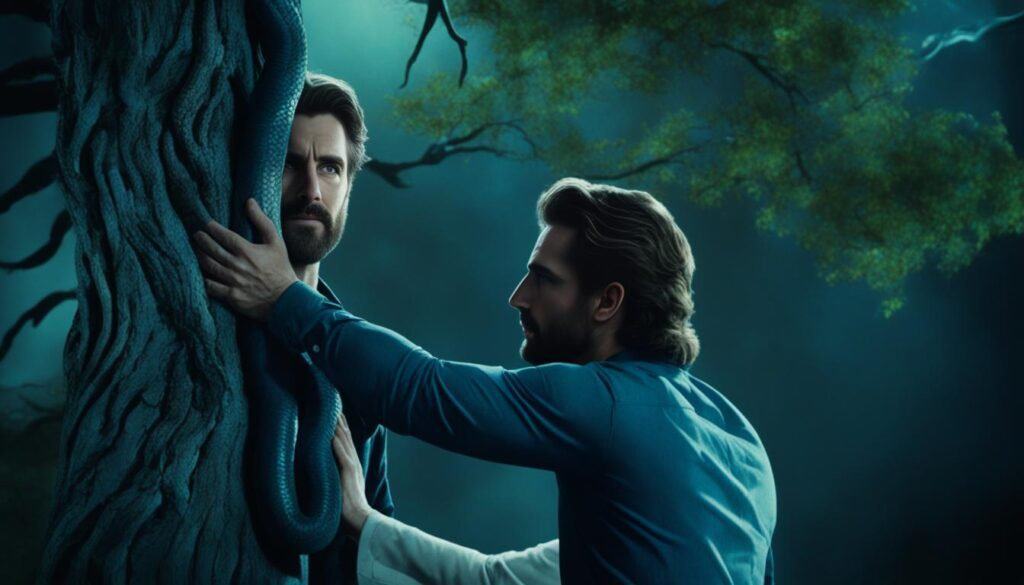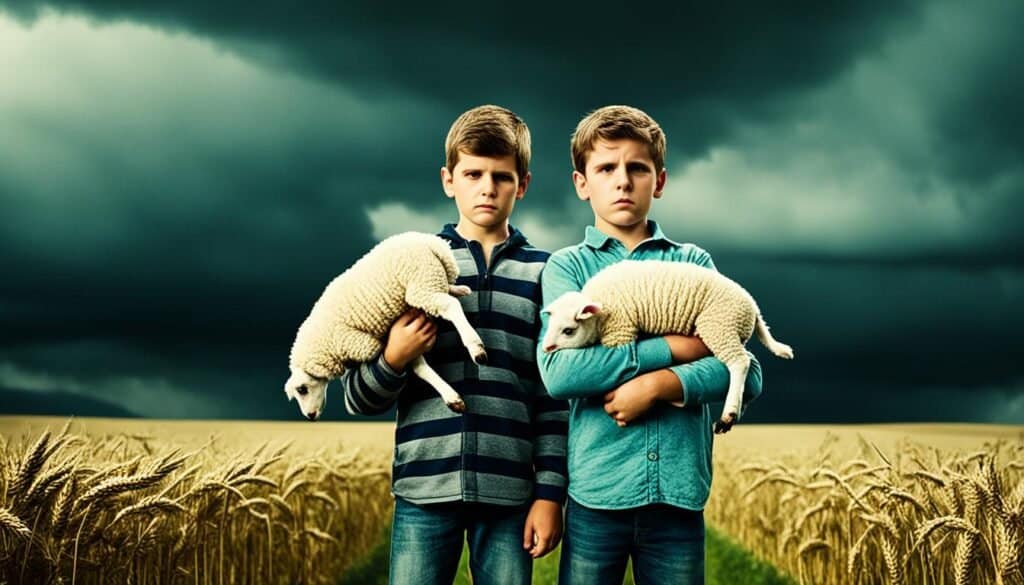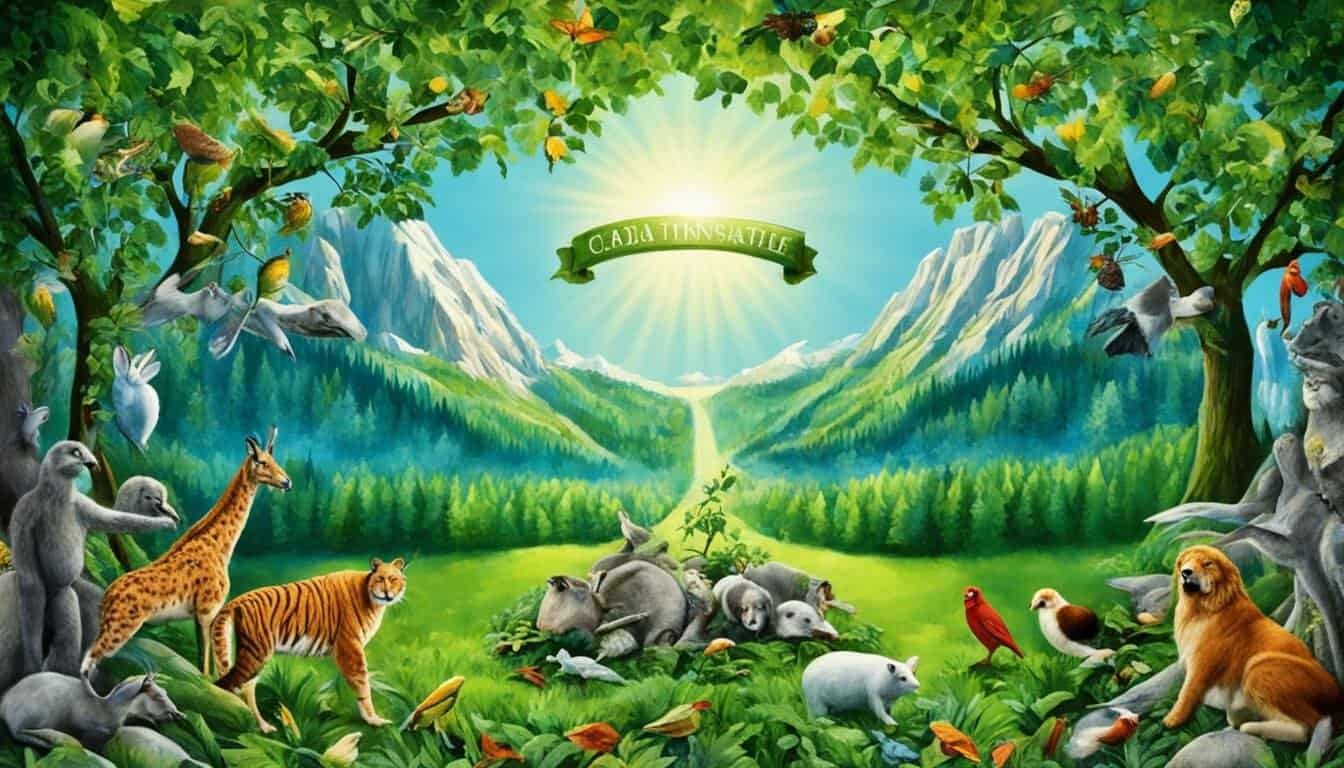Ever thought about how stories from thousands of years ago still impact us today? The book of Genesis, in the Bible, is full of narratives. It tells stories that deeply influence our culture and society.
This piece takes a closer look at how key Genesis events shaped us. From the beginning of the world to Noah’s Ark and the Tower of Babel, each story changed our cultural map.
Join us to discover Genesis’ impact on human dignity, ethics, and diversity. You’ll be surprised how these old stories affect our modern beliefs.
Key Takeaways:
- Events in the book of Genesis have had profound and lasting effects on our culture and society.
- The narratives of creation, the fall of man, and the flood have shaped our values and morality.
- Genesis highlights the importance of human dignity and the belief in the inherent worth of every person.
- The story of the Tower of Babel played a pivotal role in the origin of cultural diversity.
- These events in Genesis have influenced religious doctrines and cultural narratives for centuries.
Creation of the World and Humanity
The book of Genesis opens with an awe-inspiring story. It tells of the creation of the world and everything in it. This story gives us deep insights into our beginnings and our role in the world.
Genesis 1-2 beautifully describes how God made the universe. It shows a careful plan unfolding over six days. Each day brings something new, showing God’s incredible design and love for creation.
https://www.youtube.com/watch?v=VUEX60dx8ss
This image captures the beauty and complexity of God’s creation. Nature’s harmony proves it was not random but finely crafted by a divine hand.
When God creates people, He gives them a special role on Earth. Genesis 1:26-28 says we are made in God’s image and should care for the planet. This is a significant task that shows our purpose and responsibility.
“Then God said, ‘Let us make mankind in our image, in our likeness, so that they may rule over the fish in the sea and the birds in the sky, over the livestock and all the wild animals, and over all the creatures that move along the ground.’ So God created mankind in his own image, in the image of God he created them; male and female he created them.”
– Genesis 1:26-27
This text highlights the immense value every individual has. Being made like God shows we are unique and precious. It emphasizes the dignity of every person.
The creation story connects humans closely with nature. It promotes caring for the environment. This ensures a healthy planet for all living things.
In summary, Genesis 1-2 is not just about the starts of everything. It shows our role in the world. We are called to take care of the earth and appreciate everyone’s value. This leads to a world where people and nature live together in peace.
Human Dignity
In the book of Genesis, we learn about human dignity. It tells us that every person has worth just by being alive. This is because we are made in the image of God, also known as “imago dei.”
This idea changes how we see each other. It means everyone should get respect, kindness, and fairness. This makes a world where everyone’s rights are protected. It stops people from being treated badly because of their race, gender, or how rich they are.
“We are called to recognize and honor the imago dei in every human being, affirming their inherent worth and treating them with dignity and respect.”
This view has led to big changes in fair treatment. It helped end slavery and made sure women’s rights were recognized. It still fights for fairness for all people today.
Human dignity is like a guide for how we should treat each other. It helps us be understanding, kind, and care about others’ well-being.
It reminds us that we are all the same in what really matters. We should enjoy the ways we’re different and make a place where everyone feels welcome and valued.
Impact on Cultural Development
This belief is key in our history and culture. It has inspired our art, stories, and deep talks about what we should be doing. We long for fairness, kindness, and to find meaning in our lives.
It’s in our efforts for better rights and in our everyday actions to include others. This idea of human dignity shapes what we understand about being human.
Valuing human dignity is super important. It makes us work for a fair world. It also shows that we all hold great value.
| Key Points | Implications |
|---|---|
| The belief in human dignity stems from the understanding that humans are created in the image of God (imago dei) | It fosters a culture that values and upholds human rights, promoting equality and inclusivity. |
| The concept of human dignity has shaped historical movements for social justice and influenced the development of legal and ethical frameworks. | It has contributed to the abolition of slavery, the recognition of women’s rights, and the promotion of equality for marginalized communities. |
| Our embrace of human dignity challenges us to celebrate diversity and cultivate inclusive communities. | It calls us to affirm the unique contributions of every individual, transcending cultural and social barriers. |
| The belief in human dignity has permeated cultural development, inspiring art, literature, and philosophical discourse. | It continues to shape our cultural narrative and inform our understanding of what it means to be human. |
The Fall of Man
Genesis 3 is a key moment in our history. It shapes how we understand right and wrong. The story of Adam and Eve shows when sin began.
It teaches us about what we know is right and wrong. We all have to choose between good and bad. This story makes us think about our choices and what we are responsible for.
“And the LORD God commanded the man, ‘You are free to eat from any tree in the garden; but you must not eat from the tree of the knowledge of good and evil, for when you eat from it you will certainly die.'”
When Adam and Eve broke the rule, they were forced out of the garden. This marks the start of sin in our lives. The story is important because it shapes how we see right and wrong.
The story shows how easy it is to be tempted. It reminds us to choose what’s right. This lesson is still important today. It reminds us to do what’s right and seek fairness.

Even though we often make mistakes, there is always hope. This story is about God’s love never giving up on us.
Next, let’s look at why we need to be saved after the fall. It’s a big part of our human story.
| Key Points | Implications |
|---|---|
| The fall of man highlights the introduction of sin and disobedience. | It shapes our understanding of personal responsibility and the consequences of our actions. |
| Genesis 3 reveals the universal human experience of grappling with moral choices. | It influences cultural perspectives on ethics, justice, and the pursuit of righteousness. |
| The narrative emphasizes the need for redemption and God’s unfailing love. | It offers hope and a path towards restoration and spiritual renewal. |
Need for Redemption
We talked about how the fall impacted our moral knowledge and ethical norms. Now, let’s focus on the big theme in Genesis 3: the need for redemption.
Adam and Eve’s fall brought in sin and made our world broken. It changed our nature and left us apart from God. But, in this dark time, a light shines. We long for something better, for redemption and restoration.
The Bible tells many stories showing our need for redemption. They all lead to Jesus Christ’s sacrifice and rise from the dead. Genesis 3 starts this big story by showing the price of sin and the way back to God.
“For God so loved the world that he gave his one and only Son, that whoever believes in him shall not perish but have eternal life.” – John 3:16
The Promise of Redemption
Even after the fall, God promises a Redeemer who will beat the serpent.
“I will put enmity between you and the woman, and between your offspring and hers; he will crush your head, and you will strike his heel.” – Genesis 3:15
This promise gives us hope. It tells us that, even with our flaws, God has a plan to fix everything. Through Jesus, the promised Messiah, we get forgiveness, a reunioun with God, and a fresh start.
The Resonance in Cultural Narratives
The idea of redemption, from Genesis 3, spreads far beyond the Bible. It speaks to us through stories, books, and art worldwide. Since ancient times until today, we all seek redemption. It’s something we all long for.
So, why does the theme of redemption touch so many hearts? It’s because we all hope for another chance, to see our faults turned into something good, and to heal our brokenness. This need links us all, showing our shared wish to be whole again.
Religious Doctrines and Redemption
Genesis 3 and its need for redemption are key to many faiths. The fall underlines the importance of salvation and Jesus’s redemptive act in different beliefs.
For instance, Christianity teaches that Jesus’s work lets us be forgiven and close to God again. This belief about redemption is at the core of Christian thinking, affecting how believers see their connection with God and the meaning of their lives.
Understanding God’s redemptive plan starts with Genesis 3. It guides our stories and our search for meaning. It’s our light in a dark world, offering hope and a promise of a better future.
Cain and Abel
The tale of Cain and Abel is famous for its themes of jealousy, violence, and divine justice. It dives deep into societal views on crime and punishment. This story is rich in meaning.
The brothers, Cain and Abel, made offerings to God. Abel offered a lamb, which was accepted. But Cain’s fruits and vegetables were not. This made Cain jealous of his brother.
And the Lord said to Cain, “Why are you angry, and why has your face fallen? If you do well, will you not be accepted? And if you do not do well, sin is crouching at the door. Its desire is contrary to you, but you must rule over it.” – Genesis 4:6-7
Cain’s jealousy turned into anger. He killed Abel out of this rage. This act showed the darkness within humans, making us think about emotions’ effects.
Then the Lord said to Cain, “Where is Abel your brother?” He said, “I do not know; am I my brother’s keeper?” And the Lord said, “What have you done? The voice of your brother’s blood is crying to me from the ground.” – Genesis 4:9-10
God then approached Cain about this murder. Cain was cursed and banished but marked for protection. This showed biblical accountability and the dire results of giving in to bad urges.
This story reminds us of the ongoing fight between good and evil. It asks us to think about our choices’ effects on others. It warns against envy, uncontrolled anger, and violence.

| Themes | Implications |
|---|---|
| Jealousy | Explores the destructive consequences of jealousy and the importance of overcoming envy. |
| Violence | Raises questions about the nature of violence and its far-reaching effects on individuals and society. |
| Divine Justice | Illuminates the biblical concept of divine justice and accountability for one’s actions. |
| Criminality | Provides insight into societal understandings of crime and punishment rooted in ancient narratives. |
Noah’s Ark and the Flood
The story in the book of Genesis 6-9 tells us about Noah’s Ark and the Flood. It highlights the importance of being responsible. We learn about the impact of moral failings on society and the consequences of divine judgment.
The story of Noah’s Ark and the Flood is a powerful reminder of the importance of personal and collective accountability. It emphasizes the repercussions of moral misconduct and the need for redemption.
Noah lived in a world filled with corruption and evil. God chose him to save some people and animals from the flood by building an ark. This tale warns us about the grave results of ignoring our moral duties.
Despite the flood judging the world, there was a sign of hope. God showed mercy by saving Noah’s family. This mercy was symbolized by the rainbow covenant.
The Moral Lesson of Noah’s Ark and the Flood
This story teaches us that our actions have serious consequences. It encourages us to think about how our choices affect not just us, but the world around us too.
It also shows the balance between justice and mercy. This story encourages us to look for ways to make up for our wrongs and start anew.

| Symbol | Meaning |
|---|---|
| Rainbow | God’s covenant of mercy and promise |
| Ark | Saltd Dilvation and protection |
| Flood | Judgment and purification |
This story of Noah’s Ark and the Flood has influenced cultures for ages. It reminds us that our actions are important and calls us to follow a path of righteousness.
Rainbow Covenant
The story of Noah and the flood in Genesis shows a lot. It’s about destruction and hoping for better days. After the water went down, God promised never to flood the world again. He showed Noah a rainbow, marking this promise.
Rainbows come when the sun shines through the rain. It’s a beautiful sign that means hope and promise all over the world. God put the rainbow in the sky to remind us of His faithfulness. It’s His promise to us that He won’t flood the earth again.
God told Noah, “I have set my rainbow in the clouds. It will be the sign of the promise between me and the earth. When I fill the sky with clouds and the rainbow shows up, I will remember my promise…I won’t flood the earth to destroy all life again.” (Genesis 9:13-15)
This promise comforts people, knowing the world won’t flood again. It also shows God’s love, mercy, and his plan for saving us through Jesus. This promise is a sign of hope for everyone, shining like a rainbow.
“The rainbow shows God’s love and mercy, lasting forever. It talks to everyone, no matter where they are from or what they believe.”
The rainbow’s covenant is very important. It connects God, people, and nature in peace. It’s a sign of hope and the faithfulness of God’s promises.

Symbolic Meanings of the Rainbow Covenant
| Symbolic Meanings | Explanation |
|---|---|
| Hope and Promise | Rainbows show hope for a fresh start and God’s constant care. |
| Divine Grace | Seeing a rainbow reminds us of God’s never-ending forgiveness. |
| Universal Sign | The rainbow is a strong symbol that everyone understands and feels. |
| Unity | It means peace between God, people, and the world. |
| Renewal and Transformation | Rainbows tell us that good things can come from hard times. |
The Tower of Babel
Let’s explore the legendary story of the Tower of Babel. It comes from Genesis 11. This story is a mix of both religion and history. It helps us understand how diverse human languages and cultures originated.
In this story, the people of Babel wanted to build a tower to the sky. They ignored God’s wish for them to spread and fill the earth. God then made them speak different languages. This scattered them worldwide. This moment changed the course of their project, showing the power and beauty of diversity.
The Tower of Babel paints a unique picture of cultural diversity’s beginnings. It says God made the world diverse on purpose. By scattering people and mixing up their languages, this story argues that cultural differences are part of a divine plan. It makes our human experience richer.
“And the Lord said, ‘Behold, they are one people, and they have all one language, and this is only the beginning of what they will do. And nothing that they propose to do will now be impossible for them. Come, let us go down and there confuse their language, so that they may not understand one another’s speech.'” Genesis 11:6-7
The Significance of Cultural Diversity
Diversity improves how we see the world. It pulls us into exchanging ideas, views, and traditions. It tells us to welcome new thoughts and to widen our views. The Tower of Babel story teaches us to cheer for diversity. It helps us value the many sides of humanity.
Impact on Societal Identity
The story led to people spreading and speaking in different tongues. This created various cultures and identities. It impacted how nations and societies were born. The tale of Babel reminds us of the deep connections between different cultures. It promotes tolerance, understanding, and respect for each other’s uniqueness.
Embracing Unity in Diversity
The Tower of Babel’s lesson is clear. It highlights the dangers of striving for personal glory at the expense of others. But it also shows us a way to peace and unity. By valuing everyone’s worth and their culture, we can connect and build understanding. The story of Babel pushes us towards unity. It tells us to cherish our oneness while drawing from the beauty of our varied cultures.
Abraham’s Covenant
The story of Abraham’s covenant is very important. It’s at the heart of who the Jewish, Christian, and Muslim people believe they are. In the book of Genesis, chapters 12, 15, and 17, God’s agreement with Abraham changed the course of history. It still shapes our cultural and religious beliefs today.
This covenant shows the idea of being chosen by God. To the people in this story, they weren’t just any group. They were set apart. They had a special purpose. They deeply felt they belonged. The agreement promised blessings, a special land, and many descendants. This made their family ties, history, and heritage more important than ever.
“And I will make of you a great nation, and I will bless you and make your name great, so that you will be a blessing.” – Genesis 12:2
The covenant is also key in three big religions: Judaism, Christianity, and Islam. It teaches about believing, following, and trusting God. These qualities are very important in each of these faiths.
God’s promise to Abraham deeply influenced how we see religion and culture. The idea of being chosen has sparked debates on who’s in or out. It has shaped views on blessings and God’s role in our lives.
The Promised Land
The deal also included a promise of land. This became the homeland for those chosen by God. It’s a big deal culturally, historically, and politically. The land and the promise behind it are at the core of the group’s identity and sovereignty.
| Key Aspects | Implications |
|---|---|
| Land as a Divine Gift | Reinforces the belief that the chosen people have a sacred connection to the land, emphasizing their divine inheritance and the responsibility to steward it. |
| Promised Land as a Promised Blessing | Elevates the significance of the land, fostering a sense of divine favor and providence bestowed upon the chosen people. |
| Land as a Symbol of Identity | Deepens the collective identity of the chosen people, anchoring their cultural, religious, and historical narratives to a specific geographic location. |
(Source: Genesis 12, 15, 17)
The covenant with Abraham has a big influence. It shaped our understanding of who we are, what we inherit, and how God factors into our lives. This story plays a big role in both religion and history, shaping our world even now.
Sodom and Gomorrah
In Genesis 18-19, we read about Sodom and Gomorrah. This tale is a key part of the Bible. It shows how serious the Bible takes issues like corruption and moral decay.
Sodom and Gomorrah were cities full of evil and sin. God sent two angels to check out the cities. Their job was to find anyone good still living there.
Lot, who was a good man, welcomed the angels. He begged them to save the cities if even a few good people lived there. With Lot’s concerns, the angels agreed to look for the righteous.
But the cities’ wickedness only got worse. Lot faced a horrifying situation. The men of the city wanted to harm his angel guests.
In a shocking move to protect the angels, Lot offered his daughters to the mob. This act underlines just how corrupt the city had become.
Soon after, Sodom and Gomorrah faced God’s judgment. The cities were destroyed by fire and sulfur. Lot’s wife famously looked back against God’s orders and turned into a pillar of salt.
The Cultural Significance
The story of Sodom and Gomorrah has deep cultural and religious meaning. It is a crucial lesson about the dangers of unrestrained evil and corruption. The cities’ destruction represents God’s severe judgment.
“Sodom and Gomorrah” have come to mean places of extreme wickedness. The story is beyond just religion. It influences talk about justice and divine punishment in our society.
In our next part, we will delve into Isaac’s Blessing. This event shows us how family issues can affect many lives. It presents questions about fairness and the results of favoritism.
Isaac’s Blessing
The story in Genesis 27 is a complex mix of family ties, deception, and its effects on history. It’s about Jacob pretending to be his older brother, Esau, to get their father’s blessing. This switch changes family roles and how we see these issues throughout history.
This account explores the depth of family relationships. Isaac’s blessing was a key tradition, ensuring the receiver a prosperous future. Yet, Jacob’s mother helps him trick his father, leading to Jacob receiving the blessing meant for Esau.
This deception opens up important ethical questions. Jacob’s trick causes a bigger gap between him and Esau, leading to lasting bitterness. The story sparks a reflection on favoritism’s destructive power within families.
Moreover, Jacob’s pursuit changes his life’s course. It leads him to leave his home, facing various challenges, and finding his true self. His journey shows the danger of prioritizing self-interest over ethical principles and family unity.
“And Esau hated Jacob because of the blessing wherewith his father blessed him: and Esau said in his heart, The days of mourning for my father are at hand; then will I slay my brother Jacob.” – Genesis 27:41
This verse shows how Isaac’s blessing deeply affected Jacob and Esau. The trickery causes Esau to plan revenge, starting a cycle of family conflict.
From a biblical standpoint, Isaac’s Blessing teaches a valuable lesson. It warns against the dangers of lying, favoring one child over others, and interfering with God’s will. The importance of being truthful, fair, and respectful in family ties stands out.
Influencing Cultural Perceptions
The tale of Isaac’s Blessing isn’t just a religious story. It has symbolic meaning in cultural narratives too. This story shines a light on the big effect personal actions have on families and society for generations to come.
“The story of Isaac’s blessing illuminates the complex interplay between loyalty, deceit, and the far-reaching consequences of favoritism. This tale continues to shape cultural perceptions of family dynamics and serves as a timeless reminder of the moral responsibilities inherent in familial relationships.”
Joseph’s Rise in Egypt
Joseph’s story moves from slavery to a top role in Egypt, showing resilience, faith, and forgiveness. The Book of Genesis, chapters 37 and 39-47, tells us of his journey. It has inspired people for years about facing and overcoming hard times.
In Genesis 37, Joseph’s brothers, jealous of him, sell him into slavery. This cruel act sends him away from his family. Still, he holds onto his faith and strong work ethic. Soon, he earns a top job in an Egyptian official’s house, showing his steady character even in difficulties (Genesis 39).
“While serving in Potiphar’s house, Joseph’s smarts and organization skills shine, managing everything for his boss with excellence.”
But then, a false claim lands Joseph in prison. Even there, his faith doesn’t waver. His leadership stands out, and the prison warden puts him in charge. This shows how Joseph shines even in dark times (Genesis 39).
Fast forward to Genesis 40-41, Pharaoh has troubling dreams that nobody can explain. Joseph is remembered thanks to his earlier dream interpretations for Pharaoh’s staff. His advice saves Egypt from famine, earning him second-highest power in Egypt (Genesis 41).
This divine wisdom not only prevents a great famine but also proves Joseph’s unique role in Egypt (Genesis 41).
The story in Joseph’s legacy is rich. It highlights hope, redemption, and profound forgiveness. Despite betrayal, Joseph forgives his brothers. This act teaches a powerful lesson on reconciliation and the ability of grace to heal broken relationships (Genesis 45).
Joseph’s story boosts faith in God’s plan and in standing strong even in toughest moments. His character, integrity, and obedience to God won him a high position in Egypt. This position saved many lives during the famine (Genesis 41).
“Joseph’s tale encourages faith in God and trust in His mysterious plans. Even in dark times, his example of endurance and faith offers hope to all facing struggles.”
| Key Themes | Significance |
|---|---|
| Resilience | Joseph’s unwavering determination and faith in the face of adversity inspire individuals to persevere through challenges in their own lives. |
| Divine Providence | Joseph’s journey showcases the extraordinary alignment of circumstances and divine intervention, reminding us of the unseen hand of God at work in our lives. |
| Forgiveness | Joseph’s radical forgiveness of his brothers demonstrates the transformative power of grace and the potential for reconciliation in even the most broken relationships. |
Jacob Wrestling with God
Genesis 32 tells the story of Jacob wrestling with God. This event is seen as a powerful, life-changing experience. It shows the struggle and growth every person goes through.
Jacob’s struggle represents how personal fights lead to change. This story teaches us that our hardest times can bring the most growth. Challenges aren’t just problems, they are chances to become better.
Jacob wrestled and faced his fears, just as we often do. He questioned and doubted, but his faith helped him through. This story teaches that belief and effort are key in life’s challenges.
Jacob’s fight with God is famous for showing that tough times can make us rise. It highlights the power of never giving up, and how we all can be changed for the better.
Affiliate Disclosure: "As an Amazon Associate I earn from qualifying purchases made from links in this post. We are a participant in the Amazon Services LLC Associates Program, an affiliate advertising program designed to provide a means for us to earn fees by linking to Amazon.com."

